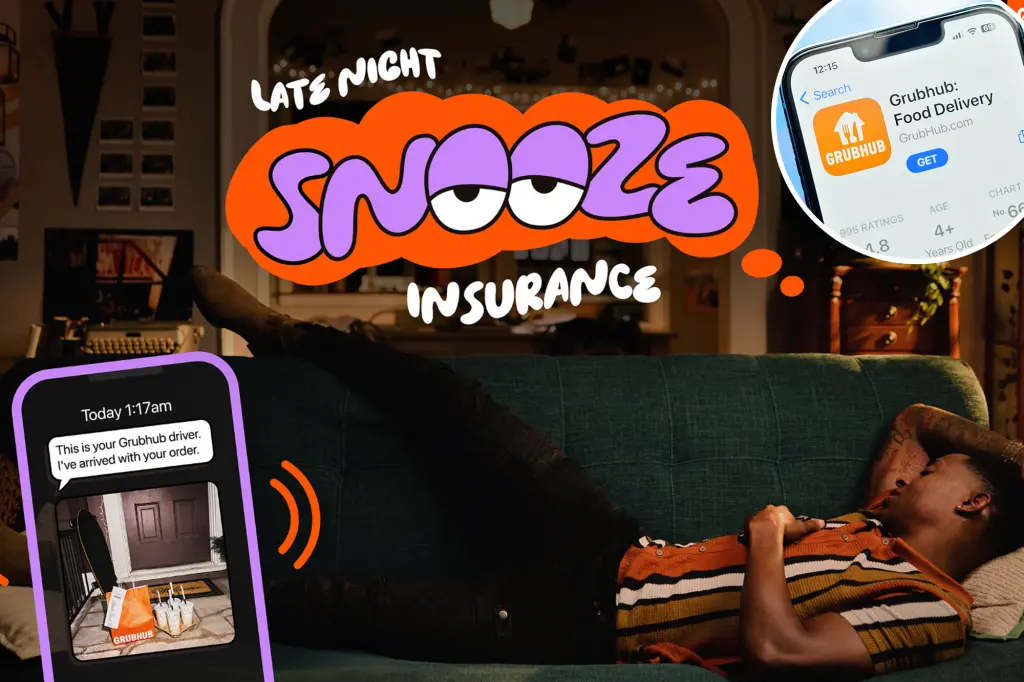Grubhub’s “Snooze Insurance”: A Lifeline for Sleep-Deprived College Students
In a world where college students burn the midnight oil studying, socializing, and inevitably ordering late-night munchies, Grubhub has introduced an innovative solution to a common campus problem. From October 18 through November 1, the popular food delivery platform is rolling out “Snooze Insurance,” a program specifically designed for university students who find themselves accidentally dozing off before their eagerly awaited food arrives. This clever initiative directly addresses a surprisingly common issue—according to Grubhub’s research, a whopping 72% of college students have fallen asleep while waiting for their late-night delivery orders. The old adage “you snooze, you lose” has long been a painful reality for hungry students whose bodies surrender to sleep before the delivery driver knocks, leaving them to wake up to cold food or missed deliveries altogether. Now, Grubhub offers a second chance at satisfaction with a $15 credit toward a replacement meal, acknowledging the unique challenges of student life where sleep deprivation often collides with hunger.
“We know the drill: students get a late-night craving, place the Grubhub order, and then between studying, a late-night hang, or one too many episodes of their favorite show, the couch wins and sleep sneaks in,” explains Christopher Krautler, Director of Grubhub Consumer Communications. This understanding of college lifestyle rhythms demonstrates Grubhub’s awareness of their core campus customer base. The company recognizes that these late-night orders aren’t just about food—they’re fuel for study sessions, rewards after finishing assignments, or essential sustenance during marathon gaming or streaming binges. When fatigue inevitably overcomes even the strongest intention to stay awake for that pizza delivery, Grubhub now offers a safety net that resonates perfectly with the unpredictable nature of student life. The timing is particularly strategic with “Halloweekend” approaching—historically one of the busiest late-night ordering periods of the academic year when campus parties and celebrations often stretch into the early morning hours.
The mechanics of the program are straightforward but require some planning from interested students. To take advantage of this limited-time offer, participants must be Grubhub+ Student members and then text “DELIVERY” to 1-844-954-OOPS (6677) every Saturday at 10 a.m. PT / 1 p.m. ET during the promotional period. Once confirmed, the $15 credit becomes available in their app, ready to redeem for that replacement meal. The company has emphasized that the program operates on a first-come, first-served basis with a limited number of redemption codes available each week, creating a sense of urgency and exclusivity around the offer. This structure cleverly encourages students to set reminders and actively engage with the promotion, generating buzz across campuses nationwide as students share tips about securing their insurance policy against sleep-induced food disappointments.
“Grubhub Snooze Insurance isn’t about judgment; it’s about understanding that college life runs on its own schedule,” Krautler further elaborates, highlighting the company’s empathetic approach to marketing. This sentiment captures the essence of what makes the campaign resonate so effectively with its target audience. College students constantly juggle competing priorities—academics, social lives, extracurricular activities, part-time jobs, and often inadequate sleep. By acknowledging this reality without condescension, Grubhub positions itself as an ally in the chaotic college experience rather than just another service provider. The language of “insurance” also cleverly frames late-night food ordering as an important investment worthy of protection, elevating what might otherwise be seen as a simple transaction into something more significant in the student lifestyle ecosystem.
The social media response to the announcement has been overwhelmingly positive, with current students expressing excitement about the program and recent graduates lamenting that it wasn’t available during their university days. Comments on Grubhub’s Instagram post reveal the universal nature of this experience, with former students asking, “Where the hell were you in 2018?!” and “Coulda used this when I was in school!” These nostalgic reactions demonstrate how effectively the campaign taps into a shared college experience that transcends generations. The promotion has generated substantial organic engagement, with students sharing their own stories of food delivery mishaps and fallen comrades who succumbed to sleep before their orders arrived. This relatability factor has transformed a simple promotional offer into a conversation piece that strengthens Grubhub’s connection with its campus customer base.
Beyond the immediate benefit to sleepy students, this campaign represents a sophisticated understanding of experiential marketing in the competitive food delivery landscape. While the financial investment of offering $15 credits might seem substantial, Grubhub gains valuable customer loyalty and brand affinity among a demographic that will continue ordering food delivery long after graduation. The “Snooze Insurance” concept addresses a pain point specific to college life but does so with humor and understanding rather than exploitation. As students text for their weekly redemption codes and share their experiences on social media, Grubhub benefits from increased engagement, app opens, and word-of-mouth marketing across campuses. With delivery services competing fiercely for market share, this type of memorable, targeted promotion helps Grubhub differentiate itself as the service that truly “gets” student life—creating positive associations that may influence ordering choices for years to come. As Halloweekend approaches and late-night study sessions intensify heading toward finals, this timely promotion positions Grubhub as not just a food delivery service but a supportive presence in the challenging, sleep-deprived reality of college existence.


